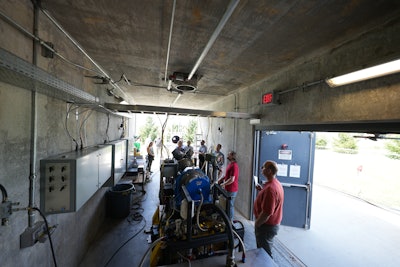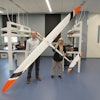
Last Friday, Pratt & Whitney and Rolls-Royce signed a joint agreement with Virginia Tech for pre-competitive research focusing on the impact of environmental contaminants on aeroengine operation and testing.
The four-year project will leverage Virginia Tech’s research and cross-discipline expertise on engine operation, instrumentation, and geosciences as well as the current research relationships that both Pratt & Whitney and Rolls-Royce have with the university.
"At Virginia Tech, we are honored to be given the opportunity to build on the foundation of our existing academic alliances by partnering with Pratt & Whitney and Rolls-Royce on this project,” said Changmin Son, the Rolls-Royce Commonwealth Professor at Virginia Tech. “The multidisciplinary group, teamed with mechanical engineering, aerospace and ocean engineering and geosciences, will work together to tackle the impact of the airborne particulate on aircraft engines, which is a huge challenge for today’s aviation industry.”
This research relationship continues longstanding collaboration between Rolls-Royce and Pratt & Whitney on issues that are common across the aerospace industry. The two companies have partnered on several government-based research projects, including a study focused on volcanic ash damage to aircraft engines.
Work on this front has taken place in the U.S., UK, and around the world, with various groups developing some of the basic understanding needed before complex modeling can be undertaken. The collaboration between Pratt & Whitney, Rolls-Royce and Virginia Tech in this research initiative is designed to add the more complicated engine testing available at Virginia Tech to further develop mitigation strategies, and to provide information back to these more basic research activities from actual engine operations.
Detrimental effects of particle ingestion are common concerns in the aerospace industry and can lead to accelerated engine aging and performance loss.
The short-term goal for this work is leveraging learning from smaller engine tests, which will be performed on a Rolls-Royce M250 engine, to influence large engine test programs by accounting for the difference in engine architecture and operating conditions.
The impact of environmental contaminants costs hundreds of millions of dollars of losses annually for both commercial and military operations as air travel has expanded around the world. This problem is a multifaceted problem that ranges from basic scientific questions about complex chemistry of the environmental contaminants within the engine, to fleet operations, maintenance procedures, engine design and even weather prediction. It spans a wide range of scientific issues to practical engineering problems which are well suited to a multi-discipline focused project.
The work done on this project will have a direct impact on Rolls-Royce and Pratt & Whitney testing methodology and capabilities and meets the needs of the company’s government customers.






















